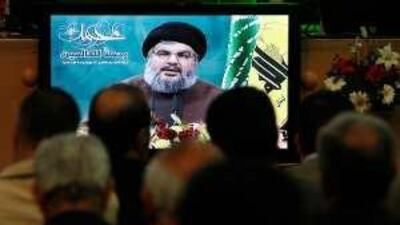BEIRUT // Hizbollah will never recognise the state of Israel, but it finds some optimism in recent overtures by the British and Saudi governments to end a regional political crisis between pro-western Arab leaders and the "resistance" bloc of Iran, Syria and their militant allies, the group's leader said in a televised speech.
Sayed Hassan Nasrallah said during a video-broadcast speech to supporters on Friday night that he rejected US conditions for a dialogue between the militant Shiite group and the new administration of Barack Obama because they required recognition of Israel. Hizbollah was formed in 1985 to oppose Lebanon's southern neighbour during the two-decade occupation of the south. "To those who impose conditions on us, we say: we will never recognise Israel," he said.
He was responding to US officials who had criticised a proposed overture by British diplomats to begin dialogue with Hizbollah's political wing. US policy, codified by law, prohibits official contact with the group, which has been designated a terrorist organisation. US officials continue to hold Hizbollah accountable for a series of attacks on Israeli, US and European targets throughout the 1980s and early 1990s. The group denies responsibility for certain attacks - including the 1983 bombings of US and French barracks during a peacekeeping mission to Beirut - arguing that the attacks predate Hizbollah's official 1985 formation.
In response to the British initiative, US officials placed recognition of Israel and the abandonment of violent resistance as a precondition for any official talks with the group. "We reject the American conditions. Today, tomorrow and after 1,000 years and even until the end of time, as long as Hizbollah exists, it will never recognise Israel," Mr Nasrallah said. "Britain's openness on the restoration of contact and dialogue with Hizbollah is a move on the right track and the party will weigh how this development can be translated on the ground," Ibrahim Moussawi, Hizbollah's spokesman said in a statement, further echoing Mr Nasrallah's argument that the group itself has conditions for talks with the United States that also have to be met.
"We have to see whether the US administration is ready to regard the Palestinians as an oppressed and occupied people and whether Washington will acknowledge the right of this people to gain back its rights and land," Mr Moussawi said. But analysts immediately pointed out that although Hizbollah plays a critical role in Lebanon's current political standoff between a pro-western government of mostly Druze, Sunnis and Christians and the Hizbollah-led Shiite opposition, substantive dialogue between the two sides had to occur on a much larger level: discussions with Hizbollah's supporters, namely, the Iranian leadership and Syrian government. "America can't talk to Hizbollah because of legal and political restrictions," said Paul Salem of the Carnegie Middle East Centre. "But its proxies in Britain, Egypt, Jordan and Saudi certainly can talk for them. But in this context, the important issue is the new administration clearly wants to talk to Syria and Iran." Another Lebanese analyst, dismissing the group's regional importance, questioned: "Regionally, why does America need to talk to Hizbollah at all? "They plan to talk to Syria and might well be headed to some kind of direct talks with Iran. In that case, you don't need to talk to Hizbollah, because you're already talking to their bosses. Outside of Lebanon, Hizbollah is only important as a symptom of the Iranian position in the region." But one expert on the group argued that the idea of direct talks between the group and any US administration remains so remote that the most important development was Mr Nasrallah's endorsement of continued regional rapprochement between Arab and Iranian leaders. Saudi Arabia and Syria have attempted to repair relations damaged by the Sunni-Shiite power struggle for Lebanon that culminated with May's violent takeover of West Beirut by Hizbollah and its allies. "This speech is, most importantly, in response to the Syrian-Saudi talks," said Amal Saad-Ghorayeb, a specialist on the group and its leadership. "The speech centred around that idea, that it is a good thing to reconcile the regional factions that have been at odds over not just Lebanon but the Israeli invasion of Gaza and rise of Hamas," she said. "They need to heal Arab rifts over Gaza." Ms Saad-Ghorayeb noted that Mr Nasrallah, in putting conditions on talks with the United States, made a strong statement that the group was unlikely to be co-opted by the new administration as it watched for what it calls a real change in US regional policies. "To say that 'We have conditions for dialogue' is unprecedented, strong language," she said. "Is the US willing to explore changes to its regional policies vis-à-vis Palestinian suffering? Hizbollah sees any talks without this as potentially dangerous. Talks without conditions will strengthen the group internationally, as remote as that might be, but it comes with a risk. The group is sensitive to being seen as 'selling out' its cause for recognition." But with even ardent opponents of US policies towards the Middle East conflict somewhat intrigued by the possibility of a change in direction by a new, and internationally popular, president, Mr Nasrallah's stern rhetoric at a time of seemingly relaxed positions bothered some Lebanese. "Man, Hassan Nasrallah needs to relax a little a little bit and let us live in peace," said 23-year old Ziad in Beirut. "I need to finish my studies and I want to stay in Lebanon. I'm studying nursing and I'm afraid by the time I'm done, Hassan will start another devastating war. Plus, what's wrong with him last night? Everybody likes Obama and want good relations with the new US administration that might bring peace to the Middle East, and we want it to happen. Enough wars, we need to live and get through with our life." mprothero@thenational.ae

